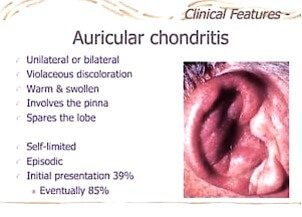WHAT ARE THE SYMPTOMS OF RELAPSING POLYCHONDRITIS?
What Are The Symptoms Of Relapsing Polychondritis?
Relapsing Polychondritis a rare autoimmune disease that is often difficult to diagnosis. The most common symptom of Relapsing Polychondritis is the sudden cause of pain to the inflamed cartilage area.
Some of other symptoms are:
- Tenderness, swelling, red rash (pimple like) breakouts and redness in one or both ears. Relapsing Polychondritis has also been known to be called, “Red Ear”. The lobe of the ear does not have cartilage and is not involved.
- Inflammation, pain, redness, tenderness can also affect the nose, throat, joints and eyes. Relapsing Polychondritis may affect any area of your body that has cartilage.
- Fever, fatigue and weight loss.
Inflammation of the ears and nose can cause the body’s cartilage to weaken and result in a saddle nose and floppy deformed ears. Inflammation to the inner ear may cause hearing impairments, nausea and loss of balance.
Inflammation of the windpipe or trachea can lead to throat intense pain, loss of voice (hoarseness) and trouble breathing may develop. Some patients with serve Relapsing Polychondritis in the trachea area may require assistance to breath.
Inflammation of joint (arthritis) can cause stiffness, swelling, redness of the joints. These joints include the hands, knees, ankles, wrists, and feet. Relapsing Polychondritis that affects the joint may make it difficult to perform everyday life.
Eye inflammation can be mild or severe and can damage vision. The steroids that treat the condition Relapsing Polychondritis can cause cataracts .
Relapsing Polychondritis is a rare chronic disease of the cartilage that is characterized by recurrent episodes of inflammation of the cartilage of various tissues of the body. The cause or trigger for Relapsing Polychondritis is unknown.
A Rheumatologist is the type of specialist that would treat Relapsing Polychondritis. There are medications to helpfully place Relapsing Polychondritis into remission but there is no cure.


